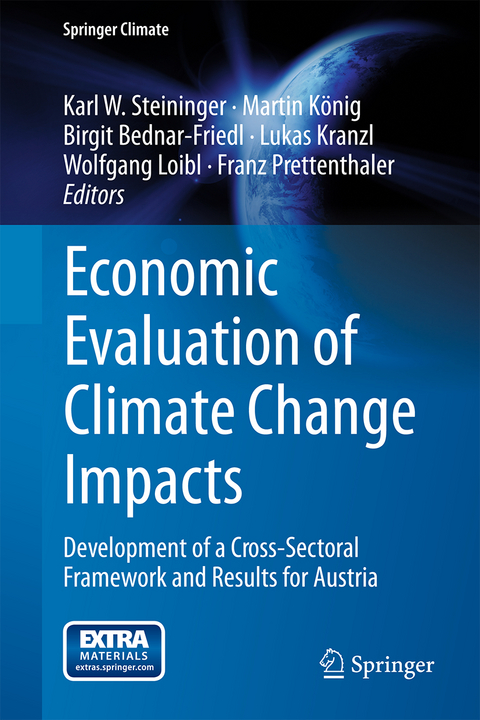
Economic Evaluation of Climate Change Impacts
Springer International Publishing (Verlag)
978-3-319-12456-8 (ISBN)
Karl W. Steininger is a Professor at the Department of Economics and head of the socioeconomic research group at the Wegener Center for Climate and Global Change, both at the University of Graz, Austria. He graduated in Economics and Computer Science at the University of Vienna and UC Berkeley, and specialized in environmental and climate economics, and in international trade. Previously he held positions in the World Bank (Environment Department), the DIW Berlin and at the University of Trieste, Italy. Martin König is a senior scientist at the Environment Agency Austria. He has coordinated activities on setting up national CCIVA research programs, initialized and coordinated EU projects for better cooperation of national climate research programs throughout Europe (CIRCLE) and is currently involved in adaptation projects providing background, instruments and DSS for different sectors and scales - from regional via national to European. Birgit Bednar-Friedl is an Associate Professor at Department of Economics, University of Graz, and Wegener Center for Climate and Global Change. Her current research interests span the economics of climate change, resource and energy economics, and international economics. Her most recent research covers several aspects of unilateral and multilateral climate policy, international burden sharing in climate policy, the macroeconomic costs of climate change impacts on various fields such as agriculture, electricity, tourism and transport. Lukas Kranzl is a senior researcher at the Institute of Energy Systems and Electrical Drives at Vienna University of Technology. He studied mechanical engineering and wrote his PhD thesis about the macro-economic impact of bioenergy systems. His research activities focus on future perspectives of sustainable energy systems with a focus on building related energy demand and supply, scenario development and analysis of policy instruments for promoting renewable and efficient energy systems. Wolfgang Loibl is a senior scientist and deputy head of the business unit Sustainable Buildings and Cities of the Energy Department at the Austrian Institute of Technology. He is coordinating the climate change impact assessment and adaptation research activities. He was and is coordinating projects and work packages at the national level and the EU level dealing with spatial modelling tasks for urban and regional development, climate impact assessment and climate change adaptation. Franz Prettenthaler is Head of the research group Regional Science, Risk and Resource Economics at the Institute for Economic and Innovation Research of JOANNEUM RESEARCH. He lectures insurance economics (Graz University of Technology, A) and holds degrees in economics and environmental systems sciences (Graz), public economics (Paris X and Cergy) and philosophy (St Andrews). He pioneered the analysis of the national risk transfer mechanism in Austria and is engaged in risk quantification and mechanism design issues in the context of natural hazards and climate change.
Executive Summary.- Introduction.- Part I: Cost on Opportunities of Climate Change at the European Level.- Part II: Evaluation at the National Level: Methodological Issues.- Part III: Fields of Impact.- Part IV: Aggregate Evaluation.
"This book presents a carefully conducted research with robust results in detail and with sufficient support and discussion from the literature. ... this book is very useful research about economic evaluation of climate change impacts development of a cross-sectoral framework and valuable exemplary analysis applied in Austria." (Meltem Ucal, Environment, Development and Sustainability, Vol. 20, 2018)
“This book presents a carefully conducted research with robust results in detail and with sufficient support and discussion from the literature. … this book is very useful research about economic evaluation of climate change impacts development of a cross-sectoral framework and valuable exemplary analysis applied in Austria.” (Meltem Ucal, Environment, Development and Sustainability, Vol. 20, 2018)
| Erscheint lt. Verlag | 23.3.2015 |
|---|---|
| Reihe/Serie | Springer Climate |
| Zusatzinfo | XVII, 468 p. 101 illus., 20 illus. in color. |
| Verlagsort | Cham |
| Sprache | englisch |
| Maße | 155 x 235 mm |
| Gewicht | 858 g |
| Themenwelt | Naturwissenschaften ► Biologie ► Ökologie / Naturschutz |
| Naturwissenschaften ► Geowissenschaften ► Meteorologie / Klimatologie | |
| Wirtschaft ► Volkswirtschaftslehre | |
| Schlagworte | climate change • Climate change impacts • Economics • Engineering • Geophysics and Meteorology • Life Sciences • Risk Management • Social Sciences and Geography |
| ISBN-10 | 3-319-12456-0 / 3319124560 |
| ISBN-13 | 978-3-319-12456-8 / 9783319124568 |
| Zustand | Neuware |
| Haben Sie eine Frage zum Produkt? |
aus dem Bereich


